Katrina Onstad hates brunch.
The Toronto-based journalist finds it to be a colossal time-waster, although she phrases it more delicately. “I’m a little ambivalent about it. I have had some really nice brunches. But the culture around it? And lining up? No. I hate it. It pushes you into a consumptive mode, and consumption is a very low value use of your free time.”
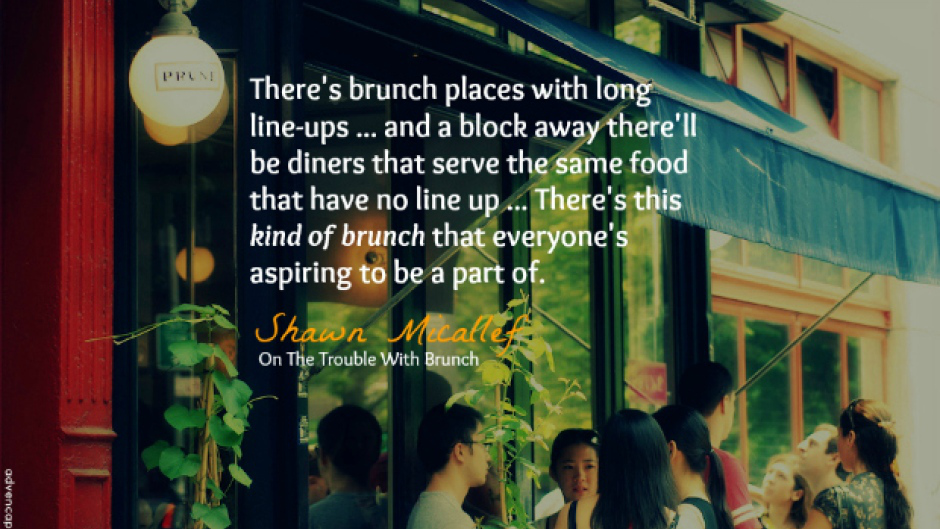
Through the course of a year researching her wide-ranging, wry, and pragmatic new book, The Weekend Effect: The Life-Changing Benefits of Taking Time Off and Challenging the Cult of Overwork, Onstad became a champion of free time. Of not squandering the little of it that we have on expensive urban brunches, or cleaning the toilet.
After her 12 year old son complained again about the end of the weekend with a “Was that really it?” voice, an echo of her own sense of disappointment at the waning 48 hour chore-fest that had done nothing to rejuvenate her, she launched into an effort to reclaim weekends for herself and her family. “His [Sunday night sadness] was a different calibre of sadness from the type I remember as a kid. We were just mourning the passing of the past 48 hours of freedom. For him, it was more a feeling of having been ripped off.”

As my 7 year old friend lamented last week as she processed her full summer schedule of bike camp and science camp commitments, “But when do we get a Relaxation Day?”
Onstad probed ecstatic dance parties, adult colouring clubs, four day week workplaces, towns that close on Sundays, Aristotlean ethics, the impact bringing your phone to bed has on your sex life, the cult of thrill-seeking, flow state, the gig economy and the history of the labour movement, in an effort to understand where things had gone wrong.
She discovered that we need free time, and in order to get it, we need to fiercely and firmly claim it for ourselves. (Aside: men tend to be better at this than women. It’s called the Gender Leisure Gap.) Once staked, we need to reserve that time for nature, art, hobbies, volunteering, unstructured play, and to generally avoid shopping and other low value consumptive experiences. It takes effort. But it’s worth it.
“Advocating and being vigilant and protecting your free time is important,” she says.” It’s not just about creative productivity. In the business world, they’re cluing in to the idea that working shorter hours has a positive effect on productivity and leads to better quality output, and smart managers are identifying that. But for me, it’s bigger than that. It’s about the quality of your life. When do you exercise your humanity, participate in community, break social isolation, make creative epiphanies [if you don’t ever take time off from work]?”
There’s something quaint and nostalgia-inducing about her revelation that without the scaffolding of religion, the original purpose of the weekend, people still seem to have a deep psychic need to congregate, to come together, to feel part of something bigger.
Pemberton’s Carlee Cindric is a chronic volunteer. She’s one of maybe a dozen people I can think of who really power community events in my little town. As a professional event planner, she has contracts to organize Slow Food Cycle, the Whistler Half Marathon and other race events in Whistler and Vancouver. She chairs the Winterfest Committee, and as a community volunteer, organized the Spud Run, helps out with Canada Day, is a Friend of Rotary, and is looking to help resurrect the Mosquito Lake trail Run.
What she has noticed is a precipitous decline in willing bodies to help with community events. It makes her worry. “Winterfest, BMX Nights, Canada Day and Slow Food Cycle Sunday all rely on the community’s support, both financially and via volunteers. And while local businesses and government bodies are quick to provide the financing, the recruitment of volunteers seems to get harder and harder with each event. I worry that Pemberton’s community events – the ones owned by and produced by locals – are on the brink of extinction.”
Already this year, the Mosquito Lake Run and the St David’s Annual Christmas Bazaar fell off the calendar.

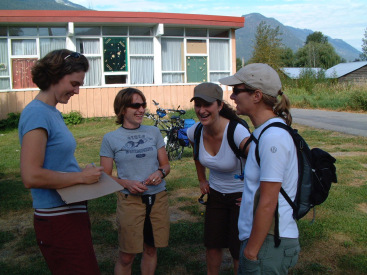

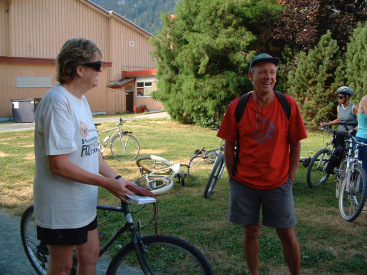
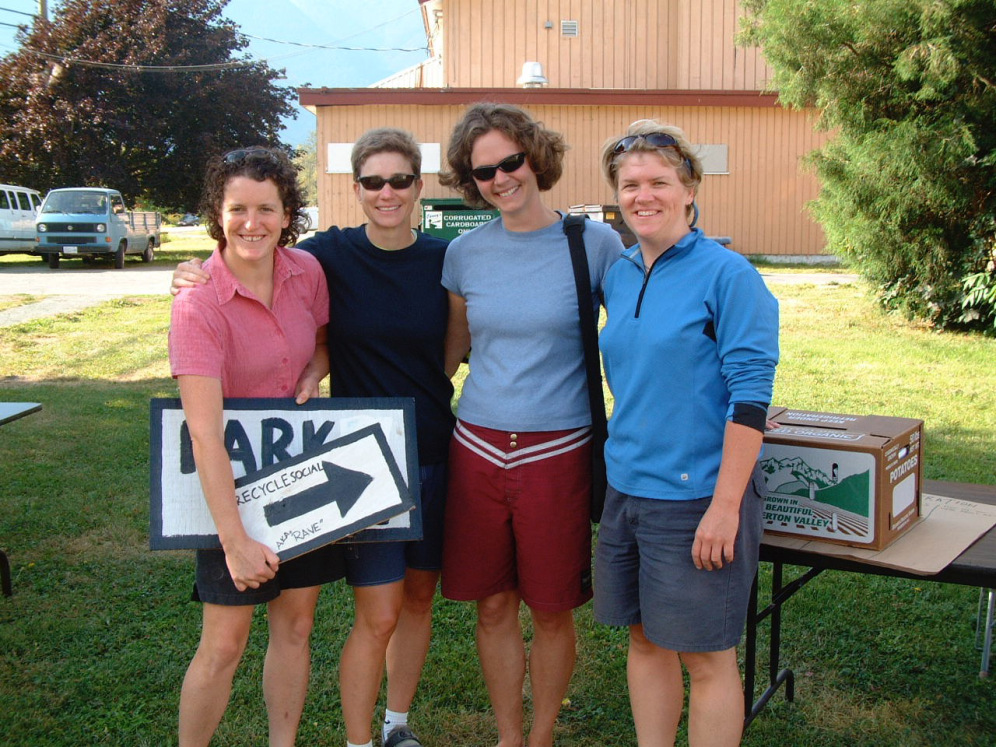 Above: throwback to the first Slow Food Cycle, 2005, and the crew of volunteers and community keeners who made it happen.
Above: throwback to the first Slow Food Cycle, 2005, and the crew of volunteers and community keeners who made it happen.
She wonders: is it volunteer burnout? Are we “evented out”? Have our longstanding events run their course? Do community events have a shelf life? Do people genuinely not have even a few hours of time to give? Or is volunteerism just no longer a thing?
“Small communities like Pemberton rely on volunteer support… it’s how things get done. But it seems as though volunteering has gone out of style.”
Onstad, and science, makes the case for reviving it. “I always thought volunteering seemed so pious,” says Onstad. “Who wants to spend their weekend doing it, when it’s so boring? The research I found said that the number one reason people give for not volunteering is that they don’t have time. But the research also found that people who give away their time are more likely to feel that they have more of it, because the value of the time increases because they feel so good. We resist volunteering because we assume our time will be depleted and we’ll feel sad, but instead, people come away feeling energized and fulfilled. If altruism isn’t going to be enough of a motivator, maybe we can spin it that way.”
Volunteering, as it turns out, actually creates the sensation of more time. Because you feel as if your time was better spent than if you’d binge-watched the latest cult Netflix series.
We’re actually wired to be compassionate, Onstad discovered. “Helping others actually feels really good – sex and chocolate good.”
Some things are worth making time for.
 Be ye not afraid of the Sabbath, my fellow heathens. It’s wise and ancient shit to keep some of your time sacred — too sacred to squander on shopping, instagramming or binge-watching TV. And definitely too sacred to work.
Be ye not afraid of the Sabbath, my fellow heathens. It’s wise and ancient shit to keep some of your time sacred — too sacred to squander on shopping, instagramming or binge-watching TV. And definitely too sacred to work.
This article originally appeared in the Whistler Question on July 18, 2017.
Advertisements Share this:
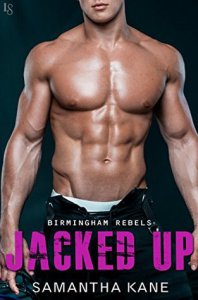

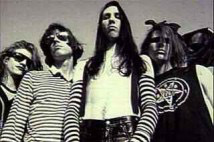
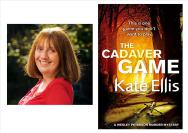
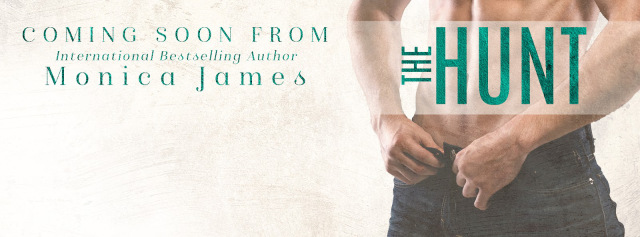
![20170722_141318_resized[610]](/ai/093/809/93809.jpg)
